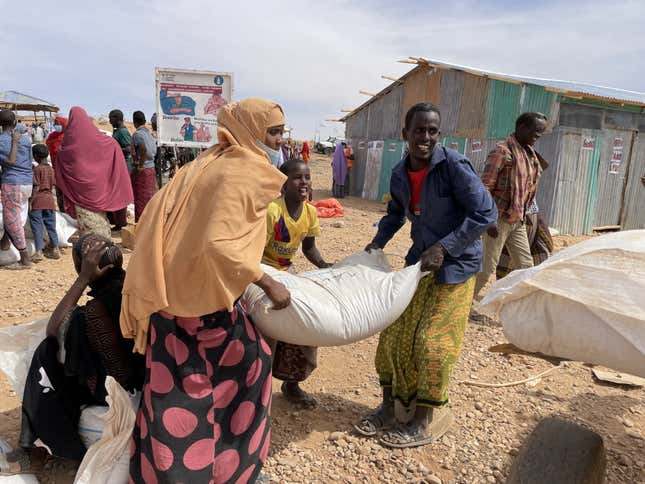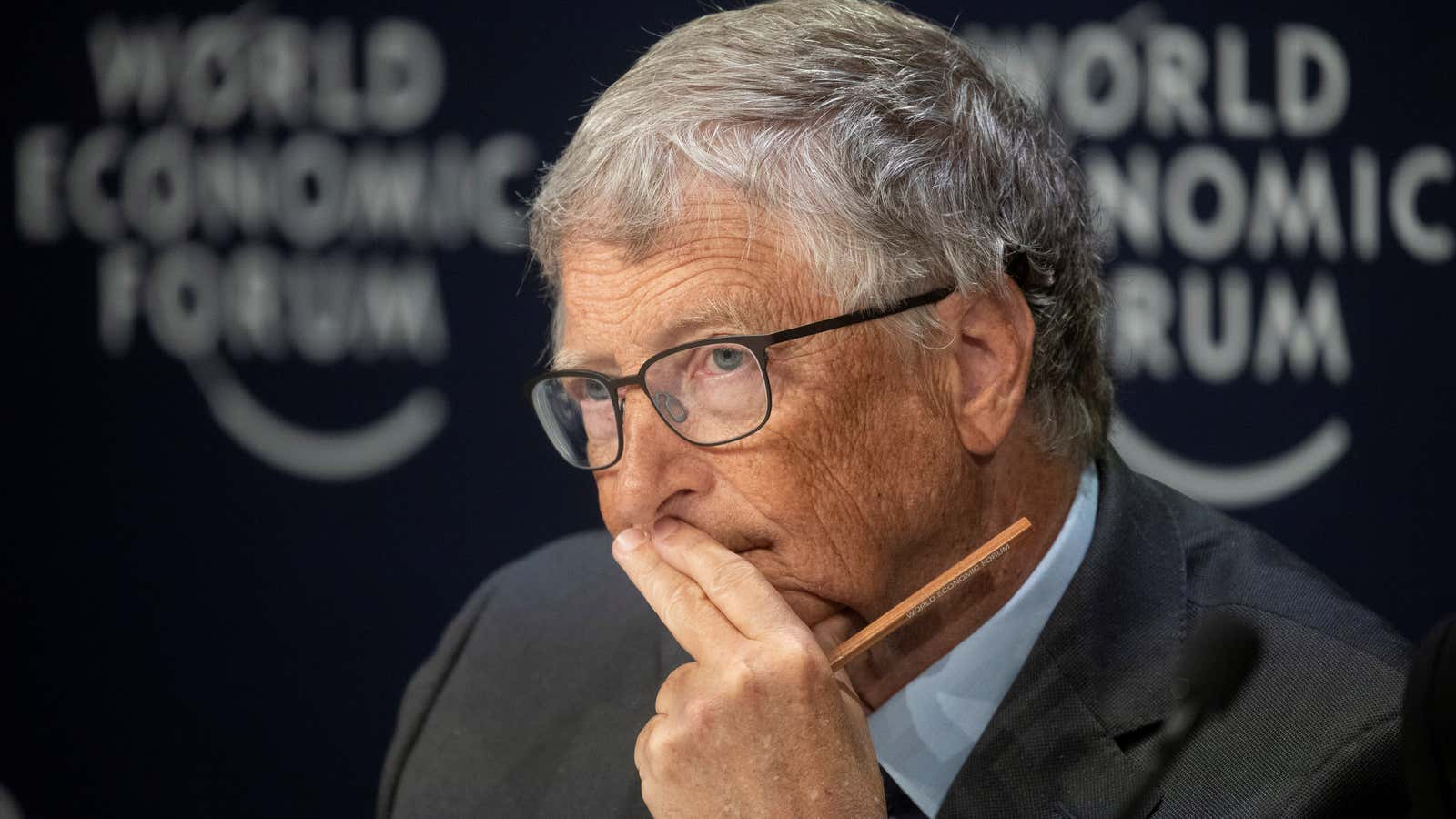After the Ukraine war scrambled trade networks for wheat and other key food commodities, the US and some other rich countries stepped up their food aid donations to countries in Africa and elsewhere hit hardest by skyrocketing prices. That should be a good news story. But to Bill Gates, it’s the latest example of how backward the approach to tackling global hunger has become.
The problem, Gates said in an interview with Quartz, is that food aid is accelerating in response to war, economic turmoil, and climate change—but investment in agricultural research in low-income countries is far lower, and stagnating. Innovations in drought-tolerant seeds custom-made for the climate and crops of African countries, and other bespoke technologies that are well within the reach of scientists, offer a more effective, sustainable path away from hunger. The current approach, Gates implied, is a band-aid that fails to heal the underlying wound.
Overall, according to a new report from the Bill and Melinda Gates Foundation, the world is failing to meet all but one of the 17 “sustainable development goals” that were adopted by the UN in 2015. That one encompasses a few sub-goals related to child mortality: If the current rate of progress continues, the world should hit the goal to bring preventable deaths of children under age 5 to 25 per 1,000 births by 2030, according to the University of Washington’s Institute for Health Metrics and Evaluation, which provides data for the Gates Foundation. It should also reach the goal to reduce neonatal mortality to at least as low as 12 per 1,000 live births by 2030.
But other goals—related to food and water security, education, the spread of HIV and malaria, and other urgent social, environmental, and health issues—remain out of reach. The pandemic and Ukraine war are partially to blame, Gates told Quartz—but so are the unwillingness or inability of governments to reconsider their spending habits. (This interview was edited for length and clarity.)
QZ: Why is it a problem that the world is spending so much on food aid?
Bill Gates: There’s no doubt food aid has saved lots of lives. But it’s very tricky. Sometimes you get too little, sometimes you get too much and you cause the price of food to drop below local farmers’ cost of production and you can actually mess up the normal agricultural markets. In parallel with whatever acute relief is required, you need the idea of inventing better seeds, educating the farmer on using those seeds, getting the credit system to work so that farmers get the fertilizer that they need. So the overall agricultural system is underinvested in.
There’s no better example of that than looking at the African continent. Given the cost of labor and the availability of land, Africa should be a net food exporter. But because of low productivity, it’s a net food importer. The urgency of the innovation pipeline comes both from the need to get African productivity up, but also the fact that the closer you are to the equator, the more damaging climate change is for agriculture. And Africa is the last place in the world where you have significant population growth. So it’s a huge challenge.
QZ: How would like to see the approach to tackling food security in Africa change?
Gates: Our goal for the public seed research system is to get up to $2 billion a year by 2030. And I don’t know if we’ll get there. That’s something that should be very affordable.
We do need to get African scientists engaged in the question of how quickly should we have gene-edited seeds or other new types of crop innovation... You would think that the world’s innovation and approval engine and getting the African capacity to decide those tradeoffs would be accelerating. We are making some progress on that. There are a number of innovative crops that are in various stages of regulatory approval, and that’s at the top of the climate adaptation list by far.
Certainly without better seeds, we are going to fall short. As you get away from maize and rice and wheat, there hasn’t been much innovation in sorghum and millet and cassava... Agricultural innovation hasn’t had the African ecosystems and crops as a high priority.
QZ: How do we seem to be doing at this point on the SDGs? It seems like, in a lot of cases, we’re not on track for meeting the goal.
Gates: We’re way off track on the goals. There are two general reasons for that. One is that many of the goals were set as extremely aspirational. Even in benign conditions, we would have been very unlikely to reach the goal.
But even the ones like childhood mortality or maternal mortality where we got a sort of “it’s possible to do”-type number in there, four things happened. Certainly the pandemic, that’s number one by a lot. The Ukraine-Russia war and what that’s doing to fertilizer prices and potentially to aid budgets... The third thing is the financial situation is such that deficit spending feels like you immediately pay for it with inflation. That means African indebtedness is starting to be a real problem. And then the fourth, I’d say that climate change—okay, we knew it was there, but the fact that it’s happening somewhat faster in terms of these heat waves, flooding, and other negative side effects. So putting that all together, that’s way more headwinds than I expected.
Now I always expect we’ll surprise a little bit on the innovation side, like better malaria drugs... What I see in the pipeline, whether it’s HIV, or our understanding of nutrition, or maternal mortality reductions—I couldn’t be more excited about that... Food security requires long term investments. Women’s empowerment requires long term investments. These goals are the ones the world should pay attention to despite the distractions, particularly in Europe.

QZ: Given these headwinds, is there a need for a fundamental re-evaluation of strategy on how we approach the goals?
Gates: Well, it was all working up until the pandemic. We are making huge progress. HIV deaths are going down, vaccination rates are going up. The world cut childhood death in half. The pipeline for malaria tools will never be as good as it is today... It is true that markets don’t incentivize innovation on behalf of the poorest. And that’s partly why we need enlightened moral governments to provide the aid. And we need philanthropists to take some of their resources and spend them not just in their own country. So I don’t think some radically different approach is called for here, despite the difficulty. I mean, you know, if we could have avoided the pandemic or the Ukraine war, God knows the economic cycle would turn at some point. It won’t last forever.
QZ: COP27, the next annual global climate summit, is coming up soon in Egypt, and will focus on international climate finance, which is far below where it needs to be. How can we change that?
Gates: Well, foreign aid and climate finance aren’t really two different things. Are you really telling people who used to buy diarrheal vaccines to zero that out and send it over into a climate bucket and say hallelujah? I mean, diarrhea is worse because of climate change, so it’s all climate-related.
There’s not much upside. In the US Congress, there’s a strong strand of “America First.” And, come on, electricity price subsidization in Europe, that’s like 2% of GDP. And rebuilding Ukraine and Ukrainian refugee costs. I mean, let’s be serious. I don’t care how many meetings you have, how much are you going to squeeze out of the rich country grant budgets?
I was a little worried when [the COP] went to yearly meetings, because the activists, although they’re righteous, their sense of how much can be done in a year… I mean, jeez, it feels like [COP26 in] Scotland was yesterday and now here we are. When it was every five years, we could almost get our act together. I’m worried that getting mad because the $100 billion isn’t there, or to change the definition so we can pretend it is there—I don’t know that that’s where the biggest impact is. So I hope the meeting ends up being a constructive thing, and not just a shrill “where’s-the-money?” thing.
